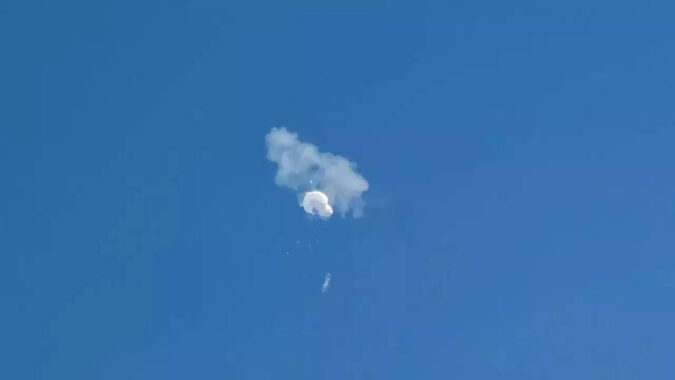WASHINGTON: Beijing rejected a request for a secure call between Pentagon chief Lloyd Austin and his counterpart on the day an American warplane shot down a suspected Chinese surveillance balloon, a US Department of Defense spokesman said Tuesday.
“On Saturday, 4 February, immediately after taking action to down the PRC balloon, the DOD submitted a request for a secure call between Secretary Austin and PRC Minister of National Defense Wei Fenghe,” Brigadier General Pat Ryder said in a statement, referring to the People’s Republic of China.
“Unfortunately, the PRC has declined our request. Our commitment to open lines of communication will continue,” Ryder added.
China says the balloon was an errant weather observation aircraft with no military purpose, but Washington has described it as a sophisticated high-altitude spying vehicle.
After slowly traversing the middle of the United States, reportedly over several top secret military sites, the balloon headed out over the east coast, where a fighter plane shot down it down on Saturday.
Austin and Wei met in Cambodia last November as Washington and Beijing sought to lower the temperature after a visit by then-speaker of the House Nancy Pelosi that enraged China.
But the balloon incident has heightened tensions, and led US Secretary of State Antony Blinken to scrap a rare trip to Beijing.
On Monday, President Joe Biden defended the decision to wait until the balloon had crossed the country to down it, saying the Defense Department concluded that it was best to do so over water.
National Security Council spokesman John Kirby said the same day that measures were taken to ensure the balloon’s instruments were “mitigated” in their ability to spy during the flyover, while “at the same time increasing and improving our ability to collect intelligence and information from it.”
General Glen VanHerck, head of the US Northern Command, said a naval ship would map the debris field left by the balloon, which is expected to measure about 1,500 by 1,500 meters (yards) in the Atlantic.
The balloon itself was up to 200 feet (60 meters) tall and carried a payload weighing several thousand pounds that was roughly the size of a regional jet aircraft, he said.
VanHerck said the balloon debris would be carefully studied.
“I don’t know where the debris is going to go for a final analysis, but I will tell you that certainly the intel community along with the law enforcement community that works this under counterintelligence will take a good look at it,” he said.
“On Saturday, 4 February, immediately after taking action to down the PRC balloon, the DOD submitted a request for a secure call between Secretary Austin and PRC Minister of National Defense Wei Fenghe,” Brigadier General Pat Ryder said in a statement, referring to the People’s Republic of China.
“Unfortunately, the PRC has declined our request. Our commitment to open lines of communication will continue,” Ryder added.
China says the balloon was an errant weather observation aircraft with no military purpose, but Washington has described it as a sophisticated high-altitude spying vehicle.
After slowly traversing the middle of the United States, reportedly over several top secret military sites, the balloon headed out over the east coast, where a fighter plane shot down it down on Saturday.
Austin and Wei met in Cambodia last November as Washington and Beijing sought to lower the temperature after a visit by then-speaker of the House Nancy Pelosi that enraged China.
But the balloon incident has heightened tensions, and led US Secretary of State Antony Blinken to scrap a rare trip to Beijing.
On Monday, President Joe Biden defended the decision to wait until the balloon had crossed the country to down it, saying the Defense Department concluded that it was best to do so over water.
National Security Council spokesman John Kirby said the same day that measures were taken to ensure the balloon’s instruments were “mitigated” in their ability to spy during the flyover, while “at the same time increasing and improving our ability to collect intelligence and information from it.”
General Glen VanHerck, head of the US Northern Command, said a naval ship would map the debris field left by the balloon, which is expected to measure about 1,500 by 1,500 meters (yards) in the Atlantic.
The balloon itself was up to 200 feet (60 meters) tall and carried a payload weighing several thousand pounds that was roughly the size of a regional jet aircraft, he said.
VanHerck said the balloon debris would be carefully studied.
“I don’t know where the debris is going to go for a final analysis, but I will tell you that certainly the intel community along with the law enforcement community that works this under counterintelligence will take a good look at it,” he said.
